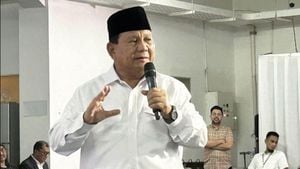Imprisoned Kremlin critic Alexei Gorinov has been handed another sentence—a three-year prison term for opposing Russia’s war against Ukraine. This latest judgment was the culmination of a swift, three-day trial indicative of Moscow's unwavering stance against dissent.
Gorinov, once just a low-profile activist and former member of Moscow's municipal council, is already serving seven years behind bars for vocalizing his opposition to the military invasion. The sentencing took place on Friday, November 29, 2024, amid tight security and intense scrutiny.
The 63-year-old Gorinov's initial conviction was secured under controversial laws enacted following the beginning of the invasion, which emerged as tools to quash any form of criticism directed at the military. These laws label dissenters as “spreading false information” about the Russian armed forces, effectively silencing voices like Gorinov's.
During this most recent trial, Gorinov symbolically wore a paper badge featuring a peace sign, exemplifying his call for peace and opposition to the Kremlin's hostile actions. This act of protest underscored the gravity of his stance and the conditions he faced even inside the courtroom.
According to reports from independent media, Gorinov entered his second trial maintaining his innocence. He has been accused of “justifying terrorism,” though he firmly believes his actual crime was merely stating the reality of Ukraine’s territorial integrity, particularly referencing Crimea as Ukrainian territory.
Through written notes submitted from his prison cell, Gorinov shared his perspective when he noted, “My guilt is... I allowed this war to happen and could not stop it,” as per commentary from the independent news site Mediazona. His words reflect both the despair of his situation and the broader tragedy of the Russian-Ukrainian conflict, carrying resonance beyond the courtroom to the global audience.
The response from human rights organizations has been swift, with many voicing outrage over what they see as blatant violations of free speech and human rights. Gorinov’s imprisonment has become emblematic of the drastic measures the Kremlin is willing to undertake to maintain control over the narrative surrounding the war.
Gorinov’s plight is not isolated. His case is part of broader actions against dissidents, where any semblance of dissent is quickly met with punitive measures. Observers note this escalation as indicative of the Kremlin's tightening grip on civil liberties as the conflict in Ukraine continues.
Commentators have stressed the international responsibility to respond to such human rights abuses. Activists and political figures worldwide are advocating for the release of all Kremlin critics unjustly imprisoned under oppressive laws, calling these actions nothing short of political persecution.
Gorinov's increasingly lengthy sentence and harsh conditions resonate with many who are closely tracking the political climate within Russia. With each new sentence handed down, the narrative of dissent becomes clearer—a narrative fraught with peril and the ever-present threat of repression.
While the trial and its outcome may serve the Kremlin's immediate interests by silencing Gorinov, it simultaneously raises significant questions about the human cost of the war and the political climate of fear being cultivated throughout Russia. For many, Gorinov's continued courage and his symbolic acts of dissent shine light on the broader struggles against authoritarianism.
Looking forward, people are left to wonder what Gorinov's story signifies for the future of resistance within Russia. Will his actions inspire others to speak out, or will the constant threat of punishment deter opposition? These dynamics are bound to play out within the nation's complicated political fabric, especially as the war continues to evolve, shaping the identities and motivations of those involved.
For now, Alexei Gorinov stands as both a symbol of resistance and the suffering endured by those who oppose the Kremlin's narrative. With each passing day, his story intertwines more deeply with the broader narrative of the conflict, leaving humanity to contemplate the true costs of war, dissent, and justice.



